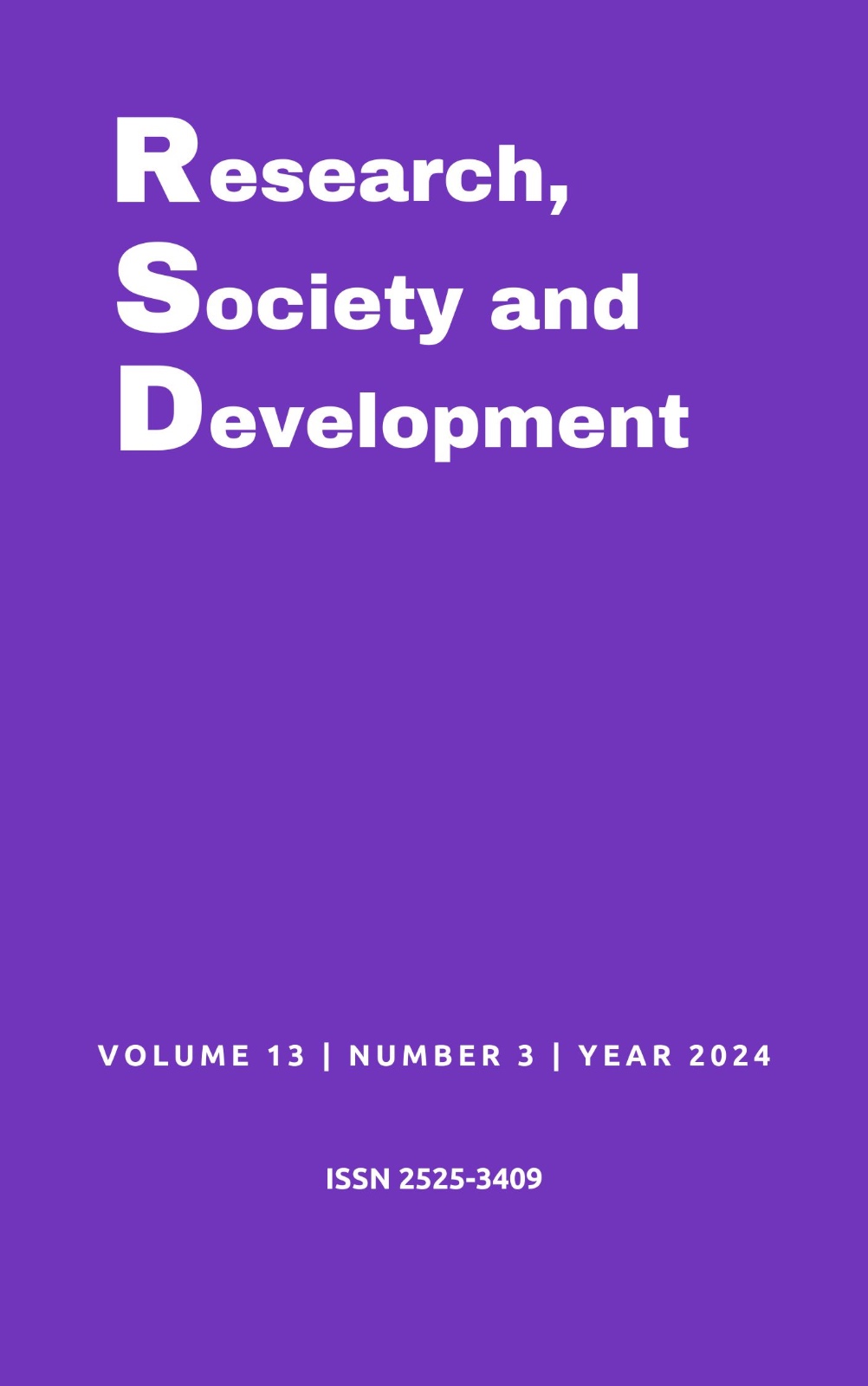Rural settlements in Brazil: Agrarian policies and their implications
DOI:
https://doi.org/10.33448/rsd-v13i3.45339Keywords:
Environment, Land reform, Property, Social relationships.Abstract
This article focuses on rural settlements in Brazil. It aims to analyze the models of rural settlements, according to data from the National Institute for Colonization and Agrarian Reform. It questions the implications of the country's agrarian policies for the settlers. Its hypothesis is that the organization of settlements should be based on the implementation of collective practices that promote the union, strengthening and social development of the group. The methodology used in this study was qualitative, reflective with a theoretical-social and exploratory focus, focusing on regional development, public policies and work. It relied on secondary sources. In order to systematize the data, the research was divided into three stages: pre-analysis of the data; study of the material; subsequent treatment of the results, inference and interpretation. It uses the science of history as a method for grasping facts in their entirety, based on the contradiction between productive forces and relations of production. The results show that in the collective organization model, once settled, the families fight and work together to achieve diversified food production, restore the balance of the environment, as well as the restitution and protection of the social and economic rights of all rural workers. He concludes that this collective organization, while enabling the resolution of internal problems, builds effective responses to external challenges.
References
Abramo, H. W. (1997). Considerações sobre a tematização social da juventude no Brasil. Revista Brasileira de Educação, (5), 25-36.
Andrade, E. S., Dresch, L. O., Tredezini, C. A. O., Bitencourt, M. B., & Pereira, R. C. (2010). A crise do sistema sócio proprietário de produção nas unidades I e II do Assentamento Itamarati em Ponta Porã/ MS. In: 45° Congresso da Sociedade Brasileira de Economia, Administração e Sociologia Rural-SOBER, Campo Grande. Anais, Campo Grande.
Baquero, R. V. A. (2006). Empoderamento: questões conceituais e metodológicas. Revista do Desenvolvimento Regional. 11(2), 77-93.
Bardin, L. (2009). Análise de Conteúdo. Edições 70, LDA.
Biscola, I. S., Mallmann, V., Aragão, L. W. R., Fernandes, S. S. L. & Fernandes, T. C. L. (2018). Relatos da Situação Econômica e Ambiental dos Agricultores do Assentamento Caracol, Município de Bela Vista, MS após 20 Anos de sua Criação. Cadernos de Agroecologia, 13(2), 1-7.
Bittencourt, A. G. (2021). Principais fatores que afetam o desenvolvimento dos assentamentos de reforma agrária no Brasil. In: Guanziroli, C. (coord.). Projeto de Cooperação Técnica INCRA/FAO. Brasília, 2008. http://www.deser.org.br/pub_read.asp?id=67.
Brunetto, I. S. (1997). Planejamento Conservacionista no Assentamento Tracutinga (Dionísio Cerqueira-SC). 200 fl. Dissertação (Mestrado em Geografia). i. Universidade Federal de Santa Catarina, Florianópolis.
Campos, A. C. V. (2014). Empoderamento e qualidade de vida de adolescentes trabalhadores assistidos por uma entidade filantrópica de apoio ao adolescente. Saúde e sociedade, 23(1).
Cooperunião. (2016). Regimento Interno da Cooperativa de Produção Agropecuária União do Oeste. Dionísio Cerqueira: Assentamento Conquista na Fronteira.
Daniel, O. (2008). Avaliação do uso da terra por meio de imagens Ikonos: o caso do Assentamento Fazenda Nova da Lagoa Grande, MS. Revista Brasileira de Agroecologia, (3), 1-5.
Delgado, G. C. (2005). A questão agrária no Brasil, 1950-2003. Questão social e políticas sociais no Brasil contemporâneo. Brasília: IPEA. http://www.ipea.gov.br/portal/images/stories/PDFs/livros/Cap_2-10.pdf.
Incra. (2018). Informações gerais sobre os assentamentos da Reforma Agrária. http://painel.incra.gov.br/sistemas/index.
Mari, C. L., Tavares, P. D. V. B. & Fonseca, V. M. (2017). Alimentos, saberes e educação para o “bem viver”: os camponeses um passo adiante. Revista Eletrônica do Mestrado em Educação Ambiental, 34(3), 37-54.
Barbosa, V. X. (2023). A luta pela reforma agrária no Brasil: uma análise do papel do movimento dos trabalhadores rurais sem-terra (MST). https://repositorio.pucgoias.edu.br/jspui/handle/123456789/7101
Marx, K. (2013). O Capital - Livro I – crítica da economia política: O processo de produção do capital. Boitempo, 894p.
Marx, K. & Engels, F. (2008). Manifesto do Partido Comunista. São Paulo: Expressão Popular, 66p.
Menegat, A. S. (2009). No coração do Pantanal: assentados na lama e na areia. As contradições entre os projetos do estado e dos assentados no assentamento Taquaral, MS. UEMS, 196 p.
Novaes, R. (2012). As Juventudes e a luta por direitos. Le Monde Diplomatique, Brasil. https://diplomatique.org.br/as-juventudes-e-a-luta-por-direitos/.
Pascoal, M., Honorato, E. C. & Albuquerque, F. A. (2008). O orientador educacional no Brasil. Educação em Revista, (47), 101-120.
Prodanov, C. C. & Freitas, E. C. (2013). Metodologia do trabalho científico: métodos e técnicas da pesquisa e do trabalho acadêmico. (2a ed.). Editora Feevale.
Terra, A. (2009). Reforma agrária por conveniência e/ou por pressão? Assentamento Itamarati em Ponta Porã–MS: o pivô da questão. Universidade Estadual Paulista. http://repositorio.unesp.br/handle/11449/105023.
Urchei, M. A., Rodrigues, J. D. & Stone, L. F. (2000). Análise de crescimento de duas cultivares de feijoeiro sob irrigação, em plantio direto e preparo convencional. Pesquisa Agropecuária Brasileira, Brasília, 35(3), 497-506.
Downloads
Published
Issue
Section
License
Copyright (c) 2024 Odemir Coelho da Costa

This work is licensed under a Creative Commons Attribution 4.0 International License.
Authors who publish with this journal agree to the following terms:
1) Authors retain copyright and grant the journal right of first publication with the work simultaneously licensed under a Creative Commons Attribution License that allows others to share the work with an acknowledgement of the work's authorship and initial publication in this journal.
2) Authors are able to enter into separate, additional contractual arrangements for the non-exclusive distribution of the journal's published version of the work (e.g., post it to an institutional repository or publish it in a book), with an acknowledgement of its initial publication in this journal.
3) Authors are permitted and encouraged to post their work online (e.g., in institutional repositories or on their website) prior to and during the submission process, as it can lead to productive exchanges, as well as earlier and greater citation of published work.


